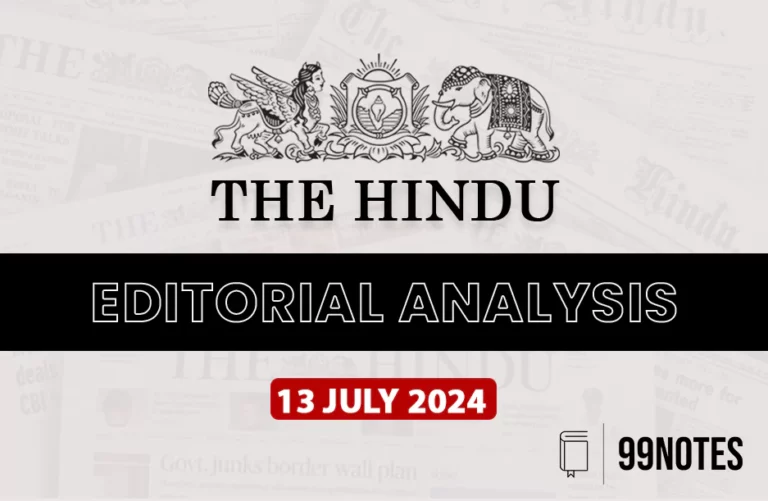26 September 2023 : The Hindu Editorial Notes PDF
The Hindu Editorial
26-September-2023
Daily Current Affairs For UPSC ,The Hindu Editorial Summary
1. On Azerbaijan’s recapture of Nagorno-Karabakh.
Topic: GS2 – International events
Context:
- Azerbaijan swiftly recaptured Nagorno-Karabakh, an Armenian-populated enclave, revealing shifting power dynamics in the Caucasus region.
Background of the conflict:
- The conflict traces back to the Soviet Union’s dissolution, with the majority Armenian-Christian population voting to break away from Shia-majority Azerbaijan.
- Armenian separatists, supported by Armenia, controlled Nagorno-Karabakh until 2020 when Azerbaijan, backed by Turkey, fought Armenia (a Russian treaty ally) and reclaimed much of the territory.
Recent Developments:
- Russia brokered a ceasefire but did not provide significant assistance to Armenia, leaving Stepanakert in local hands. However, the peace did not hold.
- Azerbaijan blockaded the Lachin Corridor, worsening economic conditions in Nagorno-Karabakh and facing international criticism.
- Azerbaijan attacked Stepanakert, prompting separatists to surrender full control to Baku.
Geopolitical Factors:
- Two key geopolitical factors benefited Azerbaijan: Turkey’s support to expand its role in the Caucasus and Russia’s focus on its Ukraine front, weakening its influence in the region.
Challenges and Concerns:
- While Nagorno-Karabakh is internationally recognized as part of Azerbaijan, historical mistrust and violence persist among Armenians in the region.
- Azerbaijan’s takeover has led to a refugee crisis in Armenia, and allegations of genocidal crimes have emerged.
- Azerbaijan’s success hinges on its ability to ensure equal rights and autonomy for the Armenian population in Nagorno-Karabakh, as failure to do so could result in prolonged resistance and an unresolved conflict.
2. Children, a key yet missed demographic in AI regulation
Topic: GS3 – artificial intelligence.
AI Global Summit and GPAI Leadership:
- India is set to host the first-ever global summit on Artificial Intelligence (AI) in October.
- India, as the Chair of the Global Partnership on Artificial Intelligence (GPAI), will also host the GPAI global summit in December.
- These events highlight the strategic importance of AI, projected to contribute $500 billion to India’s economy by 2025, accounting for 10% of the GDP.
Prime Minister’s Call for Ethical AI Framework:
- Prime Minister Narendra Modi called for a global ethical framework for AI expansion.
- India, with its vast data potential, can set an example for ethical AI policy in the Global South.
Challenges in Regulating AI for Children and Adolescents:
- The governance challenge lies in regulating AI to reduce issues of addiction, mental health, safety, and other threats faced by children and adolescents.
- AI-based digital services not designed for children are still accessed by them, posing risks like misinformation, cyberbullying, and body image issues.
- Young people also face indirect effects of their families’ online activities, such as deep fake threats.
- India’s diverse population with intersectional identities across gender, caste, religion, and more raises concerns about AI perpetuating real-world biases and inequities in the digital realm.
Misalignment of Data Protection Law:
- India’s data protection law misaligns with digital realities regarding children, placing an excessive burden on parents and hampering personalization.
- The law’s default ban on tracking children’s data can deprive them of personalized benefits.
International Best Practices and UNICEF Guidance:
- International best practices can guide Indian regulation to establish standards promoting children’s well-being, inclusion, fairness, safety, transparency, and accountability.
- UNICEF’s guidance for policymakers on AI and children, based on the UN Convention on the Rights of the Child, provides valuable principles.
Age-Appropriate Design Code:
- California’s Age Appropriate Design Code Act serves as a template for adapting regulation to different developmental stages of children.
- It emphasizes transparency, harm assessment, and age-appropriate language for user information.
Incorporating Children’s Perspectives:
- Establishing mechanisms for regular dialogue with children will help incorporate their inputs into AI regulation.
- Institutions like Australia’s Online Safety Youth Advisory Council can serve as models to make regulation responsive to threats faced by young people
- Regulation should avoid rigid prescriptions and instead embrace standards, strong institutions, and best practices to foster openness, trust, and accountability.
Conclusion:
- As India moves towards new laws to regulate internet harms and seeks to lead in global AI regulation, the interests of young citizens should be a primary focus.
Mains Question: What are the key factors driving India’s increasing emphasis on Artificial Intelligence (AI) regulation. And what challenges does the country face in ensuring ethical AI deployment.
3. G-20 diplomacy and a shifting world order
Topic: GS2 – International events
Context:
- The article discusses India’s successful hosting of the G-20 summit, achieving consensus on various issues, but highlights caution due to evolving global power dynamics and rival blocs.
G-20 Summit Success:
- India hosted the G-20 meeting in Delhi, achieving a consensus Declaration on numerous issues.
- The Declaration reflected global community hopes and endorsed PM Narendra Modi’s vision of “One Earth, One Family, One Future.”
Consensus on Ukraine Conflict:
- The G-20 achieved consensus on the Ukraine conflict by not pointing fingers at Russia for its role.
- This differs from the Bali Declaration of 2022, which condemned Russia for its aggression in Ukraine.
- Russia and China praised the New Delhi Declaration, contrary to their criticism of the Bali Declaration.
India’s Ascendancy and Caution:
- India’s role in the G-20 signifies its increased importance on the global stage.
- India should remain cautious due to the complex global situation, particularly concerning China.
China’s Concerns:
- China welcomed the Delhi Declaration but emphasized that the G-20 should focus on economic cooperation and not geopolitical and security issues.
- China expressed concerns about the India-Middle East-Europe Economic Corridor Plan being used for geopolitical purposes.
Changing G-20 Role:
- The G-20’s role has shifted from addressing economic crises to focusing on global political conflicts.
- Analysts see the G-20 as a battleground for two opposing blocs (West vs. China-Russia) vying for global supremacy.
Fading Non-Alignment:
- The proliferation of security agreements and new alignments is diminishing the concept of non-alignment.
- The world faces an uncertain future as rival camps with divergent visions of the international order strengthen.
Conclusion:
- In conclusion, while India’s hosting of the G-20 summit showcased diplomatic achievements, it must exercise caution amid evolving geopolitical tensions and the resurgence of rival blocs in global politics.
Mains Question: Discuss the evolving role of India in global diplomacy and the challenges it faces in navigating changing geopolitical dynamics.
Source: https://www.thehindu.com/opinion/lead/g-20-diplomacy-and-a-shifting-world-order/article67345820.ece
For Enquiry

26 September 2023 : The Hindu Editorial Notes PDF

25 September 2023 : Daily Quiz

25 September 2023 : Daily Answer Writing

25 September 2023 : Indian Express

25 September 2023 : PIB

25 September 2023 : Daily Current Affair

25 September 2023 : The Hindu Editorial Notes PDF

23 September 2023 : Daily Quiz

23 September 2023 : Daily Answer Writing

23 September 2023 : Indian Express
September- The Hindu Editorial 26 September 2023 : The Hindu Editorial Notes PDF The Hindu Editorial
26-September-2023
Daily Current Affairs For UPSC ,The Hindu Editorial Summary
Facebook-f
Twitter
Youtube
1. On…
Daily Quiz 25 September 2023 : Daily Quiz 25 Sep 2023 : Daily Quiz…
mains answer writing 25 September 2023 : Daily Answer Writing Mains Answer Writing
One of the key components of these exams is the written test, which consists of…
Indian Express 25 September 2023 : Indian Express Indian Express
25-September-2023
The Indian Express, CSE candidates can stay informed about current…
PIB 25 September 2023 : PIB PRESS INFORMATION BUREAU
25-September -2023
Daily Current Affairs For UPSC ,The PIB ( Press Information…
Daily Current Affairs 25 September 2023 : Daily Current Affair Daily Current Affairs
25-September-2023
Daily Current Affairs For UPSC ,Daily Current affairs of The…
September- The Hindu Editorial 25 September 2023 : The Hindu Editorial Notes PDF The Hindu Editorial
25-September-2023
Daily Current Affairs For UPSC ,The Hindu Editorial Summary
Facebook-f
Twitter
Youtube
1. An…
Daily Quiz 23 September 2023 : Daily Quiz 23 Sep 2023 : Daily Quiz…
mains answer writing 23 September 2023 : Daily Answer Writing Mains Answer Writing
One of the key components of these exams is the written test, which consists of…
Indian Express 23 September 2023 : Indian Express Indian Express
23-September-2023
The Indian Express, CSE candidates can stay informed about current…




